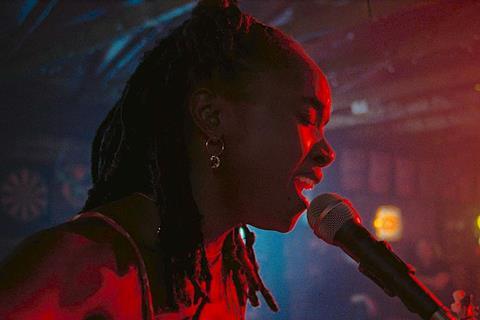KiKi Layne stars as a musican finding her voice in Nicole Riegel’s dazzling follow-up to ‘Holler’

Dir: Nicole Riegel. US. 2024. 113mins
Melodically meditative and lyrically sumptuous, writer/director Nicole Riegel’s Dandelion is a handsomely-mounted character study about a Black musician finding her voice. If that sounds like mere boilerplate, the unguarded authenticity of this film shifts its simple story away from any banality towards being a revealing narrative which celebrates the creative spirit and ponders the invisibility of Blackness.
A visually beautiful, delicately composed film
KiKi Layne is the forlorn titular singer/songwriter who takes off from her hometown of Cincinnati to a battle of folkish bands in South Dakota, finding potential romance with another acoustic player. It is a quietly rendered mix of John Carney’s Once and Ethan Hawke’s Blaze, set to a commanding soundtrack of original songs that make for a soul-stirring picture.
Premiering in the 24 Beats Per Sound section of SXSW, a vertical reserved for the musical component of this hybrid festival, Dandelion is an IFC Films production by a filmmaker whose previous film, Holler, netted her a Spirit Award nomination for Best First Feature. That pedigree suggests that Riegel’s latest effort will at least win hearts among arthouse devotees, while the presence of an electrifying Layne may grant it a shot at a wider audience.
As as singer, Dandelion is far more talented than her lounge act gig would have you believe. Every other day she steps on stage to play original songs as onlookers carry on loud conversations; it’s a vulnerable, debilitating job, singing out into the void — but with a sick mother at home, she needs the money. A bartender friend tells Dandelion about a competition at a biker rally, which awards winners the chance to open for a major country act.
The rocky set-up – the weakest part of this robust film – witnesses Dandelion engaging in a tempestuous argument with her incredulous mother. It’s a cliche-ridden shouting match whose intensity initially feels unearned, only there to set Dandelion on the road in search of stardom. But what she finds is so much more interesting: Amid redneck bikers and drunken hecklers wandering around a raucous plains town, she discovers a thriving musical community where a dashing Casey (Thomas Doherty) resides.
It is on the brushed, blissful prairie terrain where Dandelion finds its footing: Casey takes Dandelion under his wing, and the pair begin writing and crooning love songs to – and with – each other. Windswept hikes across rugged plateaus soaked by ethereal sunbeams, dashes through endless fields of grain and love making in the woods become the unforgettable notes on their ledger. Layne and Doherty (a Screen Star of Tomorrow in 2021) possess immeasurable chemistry, given greater potency by Riegel and her DoP Lauren Guiteras’ love of mixing lenses for arrestingly intimate compositions, and closing in on the faces of their simmering stars.
Despite the strength of this burgeoning romance, there are cracks. Some of these fissures appear in the agile scripting: we get the impression that not only does some bad blood exist between Casey and the other musicians, but they also share a diametrically opposite creative ethos. They play for the love of the craft, but Casey sees no point if the work will never lead to stardom.
The catchy indie folk ballads composed by Aaron and Bryce Dessner (of band The National) provide further clues to how Casey is trying to define Dandelion’s voice before she even has one. The haunting desire brimming from the righteous composition ’Over-The-Rhine’ – a song that is not inspired by a burst of inspiration but painstakingly crafted – is emblematic of her deepest wishes to be a whole, self-defined person.Those tensions restrain Riegel’s film from becoming a rehash of Once, allowing it space to philosophise on the importance of music. In that regard Riegel is following the footsteps of the offbeat biopic Blaze, a film similarly concerned with the difficult dedication required for songwriting and artistry told through the lens of a romance doomed by the growing pains of finding one’s voice.
Dandelion is also a visually beautiful, delicately composed film. Uses of double exposure, intricate tracks down long and winding roads, and Riegel’s impeccable tactility — a feel she honed with her gritty blue-collar Appalachian drama Holler — renders the landscape with the kind of elegance Andrea Arnold filmed the South with in American Honey.
Layne is equally arresting as a Black woman who often isn’t seen by audiences in a way that recalls Ralph Ellison’s Invisible Man, where Blackness through its undesirability is rendered invisible by many. This becomes a powerful through line for a character searching for artistic recognition. Buoyed by the film’s keen soundtrack, Layne gives her best performance since If Beale Street Could Talk, culminating with a rollicking bluesy smash that is as electrifyingly vibrant as the film is achingly soft.
Production companies: Automatik Entertainment, Bondit Media Capital, Griffin Drive Productions, IFC Films, Room 252
International sales: IFC Films, ifcfilmsinfo@ifcfilms.com
Producers: Rian Cahill, Adam Cobb, Nicole Riegel, Peter McClellan
Cinematography: Lauren Guiteras
Production design: Maren H. Jensen
Editing: Milena Z. Petrovic
Music: Aaron Dessner, Bryce Dessner
Main cast: Kiki Layne, Thomas Doherty, Melanie Nicholls-King, Brady Stablein, Jack Stablein, Grace Kaiser






![The Brightest SunScreen[Courtesy HKIFF]](https://d1nslcd7m2225b.cloudfront.net/Pictures/274x183/3/5/0/1448350_thebrightestsunscreencourtesyhkiff_312678.jpg)















![The Brightest SunScreen[Courtesy HKIFF]](https://d1nslcd7m2225b.cloudfront.net/Pictures/100x67/3/5/0/1448350_thebrightestsunscreencourtesyhkiff_312678.jpg)

